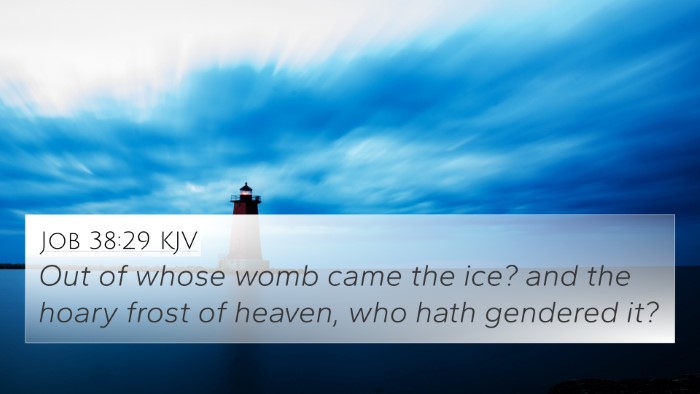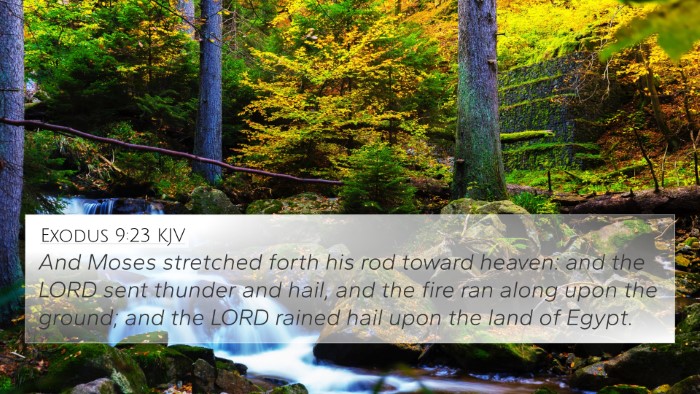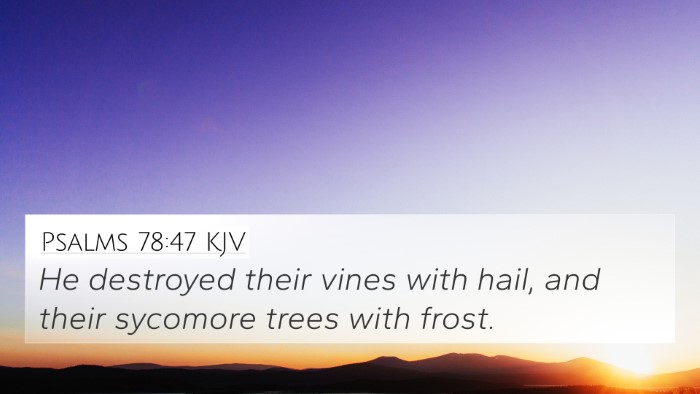Psalms 147:17 - Commentary and Meaning
Psalms 147:17 states, "He casts forth His hail like crumbs; who can stand before His cold?" This verse presents a vivid image emphasizing the power of God’s creation, showcasing His sovereignty over nature and the elements. The Psalmist uses the metaphor of hail to illustrate both the might of God’s forces and the insignificance of humans when faced with such overwhelming power.
Interpretation from Commentaries
-
Matthew Henry:
Henry expounds on the imagery of hail, illustrating how God's actions can be both beneficial and destructive. Hail, though a small element when viewed comparatively, can have significant implications, just like God's smallest decrees may have vast consequences. He emphasizes that God's sovereignty means He can wield small elements for great purpose.
-
Albert Barnes:
Barnes suggests that the cold brought forth by hail serves as a metaphor for divine judgment. He emphasizes that all creation is under God’s authority, and the verse implies that no one can withstand His judgment. Barnes links this verse to the broader theme of God’s control over the natural world, teaching that God is not only a creator but also a mighty ruler over all elements of life.
-
Adam Clarke:
Clarke notes the poetic nature of the verse and how it reflects the awe surrounding nature's phenomena. He explains that the reference to 'crumbs' may indicate God's power is so immense that the natural elements He controls are trivial in size but mighty in impact. It conveys the lesson that humans are feeble in comparison to divine forces.
Thematic Connections
This verse can be cross-referenced with several other scriptural passages to provide broader insight into God’s might and authority:
-
Job 38:22-23: Describes God commanding the storehouses of snow and hail, reinforcing God’s omnipotence.
-
Psalm 148:8: Invites all of nature, including hail and snow, to praise the Lord, indicating their service to His will.
-
Exodus 9:23-26: Accounts of God sending hail as a judgment in Egypt, showcasing His power and authority.
-
Isaiah 28:17: Illustrates the significance of justice and God’s role in judgment, likening judgment to hail.
-
Matthew 24:29: Jesus speaks of celestial signs, reflecting God's control over nature, akin to the hail mentioned in Psalms.
-
Revelation 16:21: Discusses a great hailstorm as part of divine judgment, connecting to the themes of God's might.
-
Psalm 33:6-9: Affirms that God spoke the universe into existence and stands above all creation.
-
Luke 12:54-55: Jesus remarks on the weather, demonstrating recognition of interpreting the signs of nature as part of divine providence.
-
James 5:17-18: Speaks to the effect of prayer and God's decree over nature, linking to His control over elements like hail.
-
Numbers 10:11-13: Discusses God's voice in natural elements, emphasizing His authority over the world around us.
Connecting Themes in the Bible
The connections between this verse and the others mentioned demonstrate a profound narrative of God’s rule not just in heavenly or spiritual realms but also over the physical world. This thematic connection offers insights into God’s character as omniscient and omnipotent:
-
Sovereignty: Each cross-reference highlights God's absolute control over creation, consistent with the portrayal in Psalms 147:17.
-
Judgment: Many of these verses convey elements of divine judgment, emphasizing that God's power can be a source of both protection and destruction.
-
Worship: The call for nature, and humanity, to acknowledge God’s sovereignty through praise illustrates a thematic continuity from the Psalms to New Testament teachings.
-
Prayer: The relationship between prayer and response from God’s creation suggests an interactivity that fosters faith and reliance on His power.
Importance of Cross-Referencing
Cross-referencing Bible verses is a vital tool for deeper understanding of scripture. It allows one to see how various themes coexist and interrelate throughout the Bible. Utilizing a Bible concordance or cross-reference guide can help facilitate this study. Engaging in cross-reference Bible study not only enriches knowledge but also enhances sermon preparation, personal reflection, and group discussions around Biblical themes.
Conclusion
Psalms 147:17 serves as a powerful reminder of the Lord’s sovereignty over nature and humanity's humble position before His might. Understanding this verse through the lens of public domain commentaries and careful cross-referencing can enrich one's faith journey and provide deeper insights into the nature of God.








